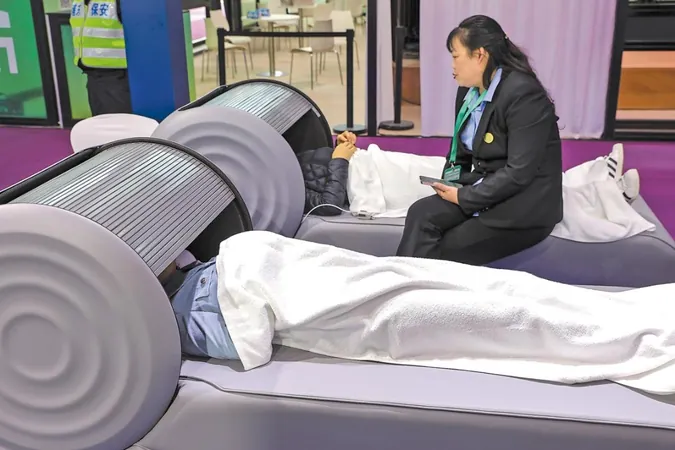
Revolutionary Sugar Swap Creates 'Super Stem Cells' That Could Transform Medicine
2025-04-25
Author: Sarah
A Game-Changer in Stem Cell Research
Scientists at the University of Copenhagen have unlocked a revolutionary method to rejuvenate stem cells by simply altering their nutrient supply! The discovery of these so-called 'super stem cells' reveals that they thrive better in culture and exhibit enhanced capabilities to transform into specialized cell types, opening new avenues in fertility treatment and regenerative medicine.
The Secret Behind the 'Super' Rejuvenation
Led by the innovative Dr. Robert Bone, the research indicates that swapping glucose for galactose in standard stem cell culture media changes the cells' primary energy source from glycolysis to oxidative phosphorylation. Dr. Bone explains, "By changing their diet, the stem cells can rejuvenate and turn into ‘super stem cells.’ This dietary shift essentially reprograms them, leading to impressive outcomes."
A Look Inside the Reprogramming Process
The groundbreaking study, published in *The EMBO Journal*, shows how this dietary modification helps embryonic stem cells (ESCs) from mice revert to a more primal state, resembling the inner cell mass of early embryos. This transformation not only boosts their capacity to differentiate into various types of cells but also arguably extends their viability.
Enhanced Functionality and Longevity
Dr. Joshua Brickman, a senior author of the study, noted, "These cells aren't just more adept at developing; they also maintain their health significantly longer than those in traditional culture conditions, and all achieved with a surprisingly simple method." This implies that the newly engineered stem cells can be used more effectively for various medical applications.
Implications for In Vitro Fertilization (IVF) and Beyond
One of the most thrilling prospects of this research is its potential impact on in vitro fertilization (IVF). The team discovered that their metabolically reprogrammed stem cells have a superior ability to form extraembryonic tissues, crucial for successful embryo implantation. Dr. Bone highlighted that 'super stem cells' excel at generating a lineage that becomes the yolk sac, which is essential for implantation success.
As the team envisions improvements in IVF technology using their metabolic insights, Dr. Brickman expresses hope for enhancing clinical embryo culture processes to increase implantation rates.
Broader Horizons: Regenerative Medicine and Aging
The potential ramifications of this study are immense, particularly concerning aging and age-related diseases. Since these rejuvenated ESCs are more similar to early developmental stages, they may efficiently generate tissues for treatments related to conditions like liver disease and neurodegenerative disorders.
Dr. Brickman speculates about the exciting possibility of using these techniques to revitalize aging cells to combat diseases such as Parkinson's, osteoporosis, and diabetes. Could this dietary switch also aid in regenerating compromised liver or heart cells to treat severe conditions like congestive heart failure?
Conclusion: A Bright Future for Stem Cell Therapy
This study underscores how simple environmental changes—like nutrient availability—can profoundly affect cell identity and fate. It lays a crucial foundation for creating reliable and therapeutically viable stem cell populations through metabolic reprogramming. As the research progresses, it could usher in a new era for stem cell therapy, providing innovative treatments for a range of medical challenges.



 Brasil (PT)
Brasil (PT)
 Canada (EN)
Canada (EN)
 Chile (ES)
Chile (ES)
 Česko (CS)
Česko (CS)
 대한민국 (KO)
대한민국 (KO)
 España (ES)
España (ES)
 France (FR)
France (FR)
 Hong Kong (EN)
Hong Kong (EN)
 Italia (IT)
Italia (IT)
 日本 (JA)
日本 (JA)
 Magyarország (HU)
Magyarország (HU)
 Norge (NO)
Norge (NO)
 Polska (PL)
Polska (PL)
 Schweiz (DE)
Schweiz (DE)
 Singapore (EN)
Singapore (EN)
 Sverige (SV)
Sverige (SV)
 Suomi (FI)
Suomi (FI)
 Türkiye (TR)
Türkiye (TR)
 الإمارات العربية المتحدة (AR)
الإمارات العربية المتحدة (AR)